NCERT Solutions Class 6 Maths
Chapter – 5 (Understanding Elementary Shapes)
The NCERT Solutions in English Language for Class 6 Mathematics Chapter – 5 Understanding Elementary Shapes Exercise 5.4 has been provided here to help the students in solving the questions from this exercise.
Chapter 5: Understanding Elementary Shapes
- NCERT Solution Class 6 Maths Exercise – 5.1
- NCERT Solution Class 6 Maths Exercise – 5.2
- NCERT Solution Class 6 Maths Exercise – 5.3
- NCERT Solution Class 6 Maths Exercise – 5.5
- NCERT Solution Class 6 Maths Exercise – 5.6
- NCERT Solution Class 6 Maths Exercise – 5.7
- NCERT Solution Class 6 Maths Exercise – 5.8
- NCERT Solution Class 6 Maths Exercise – 5.9
Exercise – 5.4
1. What is the measure of
(i) a right angle?
(ii) a straight angle
Solutions:
(i) The measure of a right angle is 900.
(ii) The measure of a straight angle is 1800.
2. Say True or False:
(a) The measure of an acute angle < 900.
(b) The measure of an obtuse angle < 900.
(c) The measure of a reflex angle > 1800.
(d) The measure of one complete revolution = 3600.
(e) If m ∠A = 530 and m ∠B = 350, then m ∠A > m ∠B.
Solutions:
(a) True, the measure of an acute angle is less than 900.
(b) False, the measure of an obtuse angle is more than 900 but less than 1800.
(c) True, the measure of a reflex angle is more than 1800.
(d) True, the measure of one complete revolution is 3600.
(e) True, ∠A is greater than ∠B.
3. Write down the measures of
(a) some acute angles
(b) some obtuse angles
(give at least two examples of each)
Solutions:
(a) The measures of an acute angle are 600, 700.
(b) The measures of obtuse angle are 1200, 1500.
4. Measures the angles given below using the protractor and write down the measure.
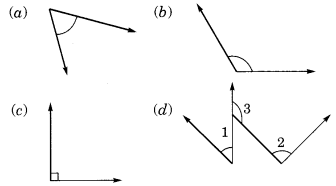
Solutions:
(a) The measure of an angle is 450
(b) The measure of an angle is 1200
(c) The measure of an angle is 900
(d) The measures of an angles are 600, 900 and 1300
5. Which angle has a large measure? First estimate and then measure.
Measure of Angle A =
Measure of Angle B =
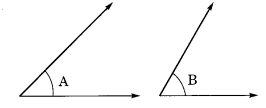
Solutions:
The measure of angle A is 400
The measure of angle B is 680
∠B has a large measure than ∠A
6. From these two angles which has larger measure? Estimate and then confirm by measuring them.
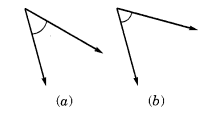
Solutions:
The measures of these angles are 450 and 550. Hence, angle shown in second figure is greater.
7. Fill in the blanks with acute, obtuse, right or straight:
(a) An angle whose measure is less than that of a right angle is _____.
(b) An angle whose measure is greater than that of a right angle is ____.
(c) An angle whose measure is the sum of the measures of two right angles is _______.
(d) When the sum of the measures of two angles is that of a right angle, then each one of them is _____.
(e) When the sum of the measures of two angles is that of a straight angle and if one of them is acute then the other should be ______.
Solutions:
(a)An angle whose measure is less than that of a right angle is acute angle.
(b) An angle whose measure is greater than that of a right angle is obtuse angle (but less than 1800).
(c) An angle whose measure is the sum of the measures of two right angles is straight angle.
(d) When the sum of the measures of two angles is that of a right angle, then each one of them is acute angle.
(e) When the sum of the measures of two angles is that of a straight angle and if one of them is acute then the other should be obtuse angle.
8. Find the measure of the angle shown in each figure. (First estimate with your eyes and then find the actual measure with a protractor).
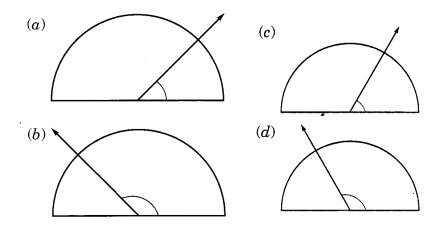
Solutions:
The measures of the angles shown in above figure are 400, 1300, 650 and 1350.
9. Find the angle measure between the hands of the clock in each figure:
 Solutions:
Solutions:
The angle measure between the hands of the clock are 900, 300 and 1800
10. Investigate :
In the given figure, the angle measure 300. Look at the same figure through a magnifying glass. Does the angle becomes larger? Does the size of the angle change?

Solutions:
The measure of an angle will not change by viewing through a magnifying glass
11. Measure and classify each angle:
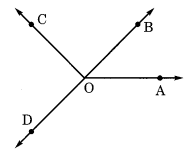
| Angle | Measure | Type | |
| ∠AOB | |||
| ∠AOC | |||
| ∠BOC | |||
| ∠DOC | |||
| ∠DOA | |||
| ∠DOB | |||
Solutions:
| Angle | Measure | Type |
| ∠AOB | 400 | Acute |
| ∠AOC | 1250 | Obtuse |
| ∠BOC | 850 | Acute |
| ∠DOC | 950 | Obtuse |
| ∠DOA | 1400 | Obtuse |
| ∠DOB | 1800 | Straight |

Leave a Reply